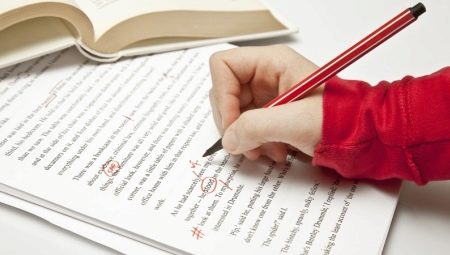Today, textual information is found everywhere: in books, newspapers, magazines, the Internet. Conscientious publishers and owners of good sites are trying to produce high-quality material from the point of view of the Russian language. However, even competent authors often make mistakes. What can we say about people who know how to generate interesting ideas, but are not friends with the rules of grammar and spelling.
This is where proofreaders come to the rescue. They monitor the literacy of texts and correct inconsistencies without affecting the meaning of phrases. About the features of the work of such people, their responsibilities and job opportunities will tell our article.
Features
Text corrector is an important profession. Authors of fiction books, heads of publishing houses, creators of text agencies on the Internet resort to their services. Of course, today there are many computer programs that help correct mistakes made through ignorance or inattention. For example, MS Word, in which many authors work (copywriters, rewriters, creators of literary works), highlights misspelled words in red, and underlines poorly coordinated sentences in green. However, this cannot be a guarantee of literacy.

Often there are situations in which, due to the wrong letter, one word turns into another. The machine cannot recognize such situations. There are also non-obvious errors, missing words, repeating the same thought, etc. Online programs (“Spelling” and others) also do not always recognize the authors' oversights.It follows from this that it is not possible to completely replace a person with automated processes in this matter.
Separately, it is worth highlighting the profession of an editor. His duties are not only correction of typos, punctuation, spelling and lexical errors. He deeply delves into the meaning of what is written, checks the correspondence of the text to the theme indicated in the title. If necessary, such a specialist rewrites entire sentences, making them more harmonious and beautiful, removes unnecessary information and repetitions. Often the duties of the editor include even checking the accuracy of the facts contained in the article or book.
Sometimes the considered positions are occupied in the company by different people. In this case, the text first goes to the editor for improvement, and then goes to the corrector, who conducts the final check.
Sometimes responsibilities are combined. In this case, the proofreader-editor does all the work to “transform” the text and prepare it for printing or publication on the Internet.

Responsibilities
The professional standard defines the responsibilities of each profession. To get a complete picture of what is being considered here, it is worth describing in detail what such a specialist does. So, the corrector:
- carefully reads the text, finding and correcting typos (appends missing letters, removes extra characters, including spaces);
- eliminates punctuation flaws;
- corrects spelling errors;
- checks semantic correspondences, observance of logical connection;
- eliminates slang words (if this is not allowed by the requirements), vernacular statements, unauthorized abbreviations;
- checks whether tables and formulas are correctly designed, whether the numbering of additional elements is correctly entered;
- forms paragraphs;
- compiles lists, replacing them with listings (if necessary);
- monitors the presence of subheadings, key phrases;
- compares the subheadings with the plan.
Thus, the result should be a text that meets all the requirements. At the same time, the corrector preserves the author's style, the main idea of the text, leaves all the facts, reasoning, conclusions presented.
If the part-time specialist is also an editor, his duties are greatly expanded. In addition to the above, such an employee:
- rewrites ugly formulated sentences;
- removes repeated thoughts, even if they are written in different words;
- eliminates unnecessary phrases that do not carry a semantic load;
- checks the consistency and consistency of storytelling;
- makes the text more vivid and expressive (if necessary), etc.
At different companies, job requirements may vary. It depends on the field of activity, the principle of organization of the work process and some other nuances.

Knowledge and skills
Despite the apparent simplicity, the work of the corrector is not suitable for everyone. Like many specific professions, this requires special personal and professional qualities. First, consider what knowledge a specialist should possess.
- Literacy. First of all, the corrector must be fluent in the language. Necessary is the knowledge of absolutely all spelling rules.
- General level of development. The specialist should be well-read and diversified, because texts of various subjects can come to check. Intelligence is also not the last value, because only an intelligent person can trace the presence of logic in statements.
- Knowledge of computer and internet. Often, proofreaders are allowed to use various additional programs and online dictionaries as assistants, because with large amounts of work even an impeccably competent person may miss a stupid mistake or typo. In addition, information is usually given on electronic media, which requires knowledge of text editors.
Depending on the specifics of the company in which the person works, he may need some other skills.
- Acquaintance with state standard specifications of paperwork. If any business texts are subject to verification, you cannot do without understanding the principles of workflow.
- Understanding the basics of typography. If you are checking any printed matter, you need to know about the requirements for preparing material for release.
- Understanding of formulas, various symbols, specific terms. Such knowledge may be required when working with educational and scientific materials.
- Knowledge of foreign language. Sometimes proofreaders work with translations, so when editing, it may be useful to refer to the source for a more accurate formulation.
In addition to the listed knowledge, of great importance are some personal qualities, without which a person will not be able to work long and successfully in this direction.
- Patience and perseverance. The work is monotonous and monotonous. For several hours a person has to look for errors in sometimes completely uninteresting texts. In this case, the creations of completely illiterate people often come across, which can unbalance. Therefore, it is important to maintain calm and equanimity, even if the number of errors approaches a catastrophic one.
- Mindfulness and concentration. There is another extreme - a curious topic comes across. In order not to get carried away by the content and not to be distracted from basic duties, it is important to be able to concentrate on spelling. At the same time, good data processing speed is important.
- Responsibility. This quality can be useful in any profession, including the one in question.
Only a person who is not distracted by trifles and always leaves the work on time can successfully work and apply for a higher position (for example, the chief editor).


Education
Most proofreaders are people who graduated from a university in one of the humanities. There are no specialties in Corrector-Editor at universities. To get the necessary knowledge, it is enough to enter the faculty of philology or linguistics. If you plan to continue to work in the editorial office of a magazine or newspaper, an excellent choice will be specialty "Publishing".
If you want to work remotely and do not count on a large salary, college knowledge may be sufficient. You can also just after graduation attend courseshelping to improve knowledge of the language. Of course, this option is suitable only for those who have an innate sense of literacy and high intellectual abilities.
As for the additional knowledge that may be required to work in a particular company (basic computer skills, knowledge of the basics of paperwork, understanding the requirements for articles on the Internet, etc.), they can be obtained independently.
Sometimes a corrector is required in a specialized publication or on a highly specialized website (for example, with texts on a legal topic). In such a case, education appropriate to the subject of the texts would be welcome. In this example, a person with a law degree will happily be hired.

Where does it work?
As already mentioned, a person with the skills of a proofreader and an editor can either get a job in a specific place or conclude an agreement on remote cooperation. Consider the most common options.
- Book publishers periodicals (magazines, newspapers). In such places errors are unacceptable. Given the seriousness of such companies, the requirements for employees are high. As a rule, only people with higher education are hired.
- Advertising agencies. Firms that issue banners, landing pages, advertising articles and announcements in the media and on the Internet usually have a wide staff of employees, including not only designers and copywriters with creative thinking, but also people who monitor literacy.
- Some companies doing business in various fields. In most companies, the literacy of all employees is a prerequisite, so a separate post of corrector is not provided. Nevertheless, among the vacancies you can find such options. At the same time, sometimes very respectable companies offering a good salary look for specialists who check documents for errors.
- Firms involved in the translation of fiction and technical literature. As a rule, in such companies there are people who are fluent in a foreign language. However, translations often turn out to be plain. Therefore, before being published, editors “grind” them.
- Large sites. Analysis of options for remote employment should start from this point. Owners of serious sites have in their staff authors of articles, designers and, of course, proofreaders, editors.
- Proofreading and editorial agencies. These are special companies that provide text verification services. By contacting them and offering your services, you can count on a very promising position and a decent reward.
- The scope of copywriting. Freelancers working on their own often take as assistants people who check written texts and bring them to the ideal in terms of spelling.


Thus, if you want to get a job in any company, you should contact the labor exchange, regularly view ads on the Internet and newspapers. If you are closer to the remote option of earning, you can look for one-time customers on freelance exchanges, in social networks, in various forums.
The income level of the representative of the profession in question may vary. This is influenced by many factors:
- type of activity (office work or freelance);
- place of residence (companies in large cities usually pay more);
- nature of remuneration (monthly salary or piecework payment);
- duties (easy proofreading or deep literary editing);
- education (employees with philological diplomas usually have a more decent income);
- the amount of work (the greater the burden that falls on the shoulders of a specialist, the more substantial rewards he receives).
In this way, the corrector can earn from 10 rubles for 1000 checked characters of the text. Such low prices are usually faced by beginners without higher education, who appear on the freelance exchange. The highest bar is not set. Some experts with extensive experience and good recommendations take from 300 rubles for editing 1000 characters or more. As for the fixed salary in publishing houses and other companies, here the salary can be from 10 to 100 thousand rubles per month, depending on the region and other nuances.











